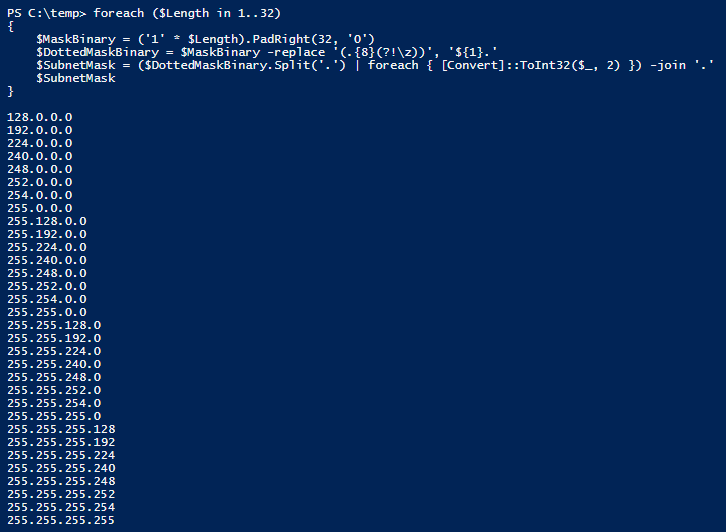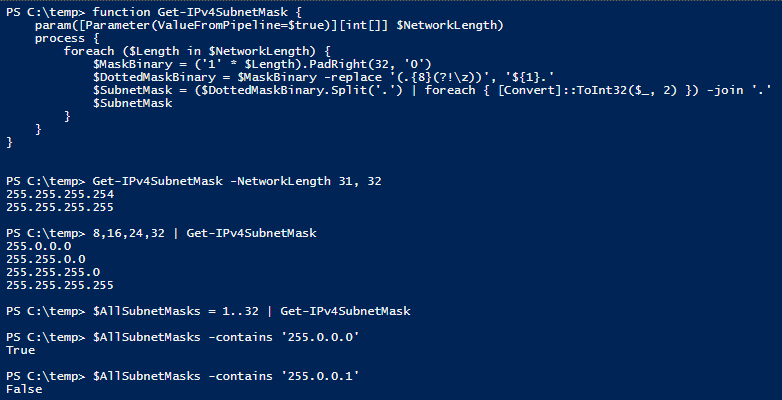Jump to page sections
- Example screenshot of all IPv4 subnet masks
- Example function for listing IPv4 subnet masks
- Validating a little more efficiently
- Example use
- Verifying our own results
- A missing piece of the puzzle?
With the small number of possible subnets, an array and the -Contains operator should be fine for most purposes (32 possible network lengths - or 33 if you toss in 0), but I'll show you other ways that will perform better too, for the sake of elucidation, and potentially to fulfill a rare need (if you have such a need, you probably don't need this article).
Example screenshot of all IPv4 subnet masks

Example function for listing IPv4 subnet masks

Here's the source code for the function in the screenshot above.
function Get-IPv4SubnetMask {
param(
[Parameter(ValueFromPipeline=$true)]
[int[]]
[ValidateRange(1,32)]
$NetworkLength
)
process {
foreach ($Length in $NetworkLength) {
$MaskBinary = ('1' * $Length).PadRight(32, '0')
$DottedMaskBinary = $MaskBinary -replace '(.{8}(?!\z))', '${1}.'
$SubnetMask = ($DottedMaskBinary.Split('.') | foreach { [Convert]::ToInt32($_, 2) }) -join '.'
$SubnetMask
}
}
}
This code can be used to validate the subnet masks as you can see with the array and -contains, but I also demonstrate another way that should be a bit more efficient below. It really will not matter in 99.n % of the cases, and using the -Contains operator on an array should be enough.
I also talk a bit more about binary addresses if you read on.PS C:\> $AllSubnetMasks = 1..32 | Get-IPv4SubnetMask PS C:\> $AllSubnetMasks -contains '255.0.0.0' True PS C:\> $AllSubnetMasks -contains '255.0.0.1' False
Validating a little more efficiently
It can parse and validate both a binary subnet mask and a dotted-decimal subnet mask (possibly in the same run).
function Test-IPv4SubnetMask {
[CmdletBinding()]
param(
[string] $SubnetMaskBinary,
[string] $SubnetMaskDottedDecimal)
if ($SubnetMaskBinary) {
if ($SubnetmaskBinary -match '01') {
Write-Verbose -Message "Invalid binary IPv4 subnet mask: '$SubnetMaskBinary'. Matched pattern '01'."
$false
} elseif ($SubnetMaskBinary.Length -ne 32) {
Write-Verbose -Message "Invalid binary IPv4 subnet mask: '$SubnetMaskBinary'. Length was different from 32."
$false
} elseif ($SubnetMaskBinary -match '[^01]') {
Write-Verbose -Message "Invalid binary IPv4 subnet mask: '$SubnetMaskBinary'. Was not all ones and zeroes."
$false
} else {
$true
}
}
if ($SubnetMaskDottedDecimal) {
function Convert-IPToBinary {
param([string] $IP)
$IP = $IP -replace '\s+' # remove whitespace for fun
try
{
return ($IP.Split('.') | ForEach-Object { [System.Convert]::ToString([byte] $_, 2).PadLeft(8, '0') }) -join ''
}
catch
{
Write-Warning -Message "Error converting '$IP' to a binary string: $_"
return $Null
}
}
$Binary = Convert-IPToBinary -IP $SubnetMaskDottedDecimal
if ($Binary) {
Test-IPv4SubnetMask -SubnetMaskBinary $Binary
} else {
$false
}
}
}
Example use
PS C:\> Test-IPv4SubnetMask -SubnetMaskBinary '11' -Verbose
VERBOSE: Invalid binary IPv4 subnet mask: '11'. Length was different from 32.
False
PS C:\> Test-IPv4SubnetMask -SubnetMaskBinary (('1' * 30) + '00') -Verbose
True
PS C:\> Test-IPv4SubnetMask -SubnetMaskBinary (('1' * 30) + '01') -Verbose
VERBOSE: Invalid binary IPv4 subnet mask: '11111111111111111111111111111101'. Matched pattern '01'.
False
PS C:\> Test-IPv4SubnetMask -SubnetMaskBinary (('1' * 30) + 'xx') -Verbose
VERBOSE: Invalid binary IPv4 subnet mask: '111111111111111111111111111111xx'. Was not all ones and zeroes.
False
PS C:\> Test-IPv4SubnetMask -SubnetMaskDottedDecimal 128.0.0.0
True
PS C:\> Test-IPv4SubnetMask -SubnetMaskDottedDecimal 128.0.0.1 -Verbose
VERBOSE: Invalid binary IPv4 subnet mask: '10000000000000000000000000000001'. Matched pattern '01'.
False
PS C:\> Test-IPv4SubnetMask -SubnetMaskDottedDecimal 128.0.0.x -Verbose
WARNING: Error converting '128.0.0.x' to a binary string: Cannot convert value "x" to type "System.Byte".
Error: "Input string was not in a correct format."
False
Verifying our own results
PS C:\> Get-IPv4SubnetMask 1 | foreach { Test-IPv4SubnetMask -SubnetMaskDottedDecimal $_ }
True
PS C:\> Get-IPv4SubnetMask (1..32) | foreach { Test-IPv4SubnetMask -SubnetMaskDottedDecimal $_ }
True
True
True
True
True
True
True
True
True
True
True
True
True
True
True
True
True
True
True
True
True
True
True
True
True
True
True
True
True
True
True
True
A whole lot of truth!
A missing piece of the puzzle?
And for someone who might want to create a list of binary subnet masks, I leave that as an exercise for the reader, but here's an example "IPToBinary" function I conveniently ripped (and modified slightly) from my PSipcalc script, to help you along the way (use it on the generated list of dotted-decimal subnet masks in a foreach, or similar).
function Convert-IPToBinary {
param([string] $IP)
$IP = $IP -replace '\s+' # remove whitespace for fun/flexibility
try
{
return ($IP.Split('.') | ForEach-Object { [System.Convert]::ToString([byte] $_, 2).PadLeft(8, '0') }) -join ''
}
catch
{
Write-Warning -Message "Error converting '$IP' to a binary string: $_"
return $null
}
}
Powershell
Windows
Networking
Regex
Blog articles in alphabetical order
A
- A Look at the KLP AksjeNorden Index Mutual Fund
- A primitive hex version of the seq gnu utility, written in perl
- Accessing the Bing Search API v5 using PowerShell
- Accessing the Google Custom Search API using PowerShell
- Active directory password expiration notification
- Aksje-, fonds- og ETF-utbytterapportgenerator for Nordnet-transaksjonslogg
- Ascii art characters powershell script
- Automatically delete old IIS logs with PowerShell
C
- Calculate and enumerate subnets with PSipcalc
- Calculate the trend for financial products based on close rates
- Check for open TCP ports using PowerShell
- Check if an AD user exists with Get-ADUser
- Check when servers were last patched with Windows Update via COM or WSUS
- Compiling or packaging an executable from perl code on windows
- Convert between Windows and Unix epoch with Python and Perl
- Convert file encoding using linux and iconv
- Convert from most encodings to utf8 with powershell
- ConvertTo-Json for PowerShell version 2
- Create cryptographically secure and pseudorandom data with PowerShell
- Crypto is here - and it is not going away
- Crypto logo analysis ftw
D
G
- Get rid of Psychology in the Stock Markets
- Get Folder Size with PowerShell, Blazingly Fast
- Get Linux disk space report in PowerShell
- Get-Weather cmdlet for PowerShell, using the OpenWeatherMap API
- Get-wmiobject wrapper
- Getting computer information using powershell
- Getting computer models in a domain using Powershell
- Getting computer names from AD using Powershell
- Getting usernames from active directory with powershell
- Gnu seq on steroids with hex support and descending ranges
- Gullpriser hos Gullbanken mot spotprisen til gull
H
- Have PowerShell trigger an action when CPU or memory usage reaches certain values
- Historical view of the SnP 500 Index since 1927, when corona is rampant in mid-March 2020
- How Many Bitcoins (BTC) Are Lost
- How many people own 1 full BTC
- How to check perl module version
- How to list all AD computer object properties
- Hva det innebærer at særkravet for lån til sekundærbolig bortfaller
I
L
M
P
- Parse openssl certificate date output into .NET DateTime objects
- Parse PsLoggedOn.exe Output with PowerShell
- Parse schtasks.exe Output with PowerShell
- Perl on windows
- Port scan subnets with PSnmap for PowerShell
- PowerShell Relative Strength Index (RSI) Calculator
- PowerShell .NET regex to validate IPv6 address (RFC-compliant)
- PowerShell benchmarking module built around Measure-Command
- Powershell change the wmi timeout value
- PowerShell check if file exists
- Powershell check if folder exists
- PowerShell Cmdlet for Splitting an Array
- PowerShell Executables File System Locations
- PowerShell foreach loops and ForEach-Object
- PowerShell Get-MountPointData Cmdlet
- PowerShell Java Auto-Update Script
- Powershell multi-line comments
- Powershell prompt for password convert securestring to plain text
- Powershell psexec wrapper
- PowerShell regex to accurately match IPv4 address (0-255 only)
- Powershell regular expressions
- Powershell split operator
- Powershell vs perl at text processing
- PS2CMD - embed PowerShell code in a batch file
R
- Recursively Remove Empty Folders, using PowerShell
- Remote control mom via PowerShell and TeamViewer
- Remove empty elements from an array in PowerShell
- Remove first or last n characters from a string in PowerShell
- Rename unix utility - windows port
- Renaming files using PowerShell
- Running perl one-liners and scripts from powershell
S
- Sammenlign gullpriser og sølvpriser hos norske forhandlere av edelmetall
- Self-contained batch file with perl code
- Silver - The Underrated Investment
- Simple Morningstar Fund Report Script
- Sølv - den undervurderte investeringen
- Sort a list of computers by domain first and then name, using PowerShell
- Sort strings with numbers more humanely in PowerShell
- Sorting in ascending and descending order simultaneously in PowerShell
- Spar en slant med en optimalisert kredittkortportefølje
- Spre finansiell risiko på en skattesmart måte med flere Aksjesparekontoer
- SSH from PowerShell using the SSH.NET library
- SSH-Sessions Add-on with SCP SFTP Support
- Static Mutual Fund Portfolio the Last 2 Years Up 43 Percent
- STOXR - Currency Conversion Software - Open Exchange Rates API
